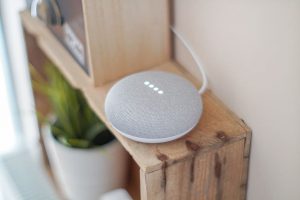Smart Assistants and the Web of the Future
First appearing in the form of Siri for iPhone in October 2011, smart assistants were initially restricted to mobile use. Three years later, Amazon launched Alexa with Echo. This time, this device has been designed to be used at home. In 2016, Google enters the race and presents its new smart speaker: Google Home. After its success, they soon extended the technology to televisions and cars.
What is the reason behind this craze? And should we consider these devices to be revolutionary to the way we will henceforth be using the Web? We will take a closer look at this phenomenon.

Are smart assistants really useful or are they just a craze?
What value really lies behind all these smart assistants? Smart assistants combine many built-in features, enabling users to remotely access these features through voice commands. For example, we can use them as an alternative to the traditional keyboard/mouse combo (or even touch screens). It is possible to launch a search, send a message, or add an appointment to your calendar simply with your voice. Smart assistants are able to respond to users thanks to more or less sophisticated artificial intelligence equipped with speech recognition. Basically, the main goal of smart assistants is to give an immediate answer to what is on your mind at a particular moment.
This concept is very attractive on paper and is, unsurprisingly, a real hit among consumers. Sales skyrocketed. Considered a must-have gift at the end of 2017, some websites even went as far as publishing articles entitled “Why everyone should own a Google Home, Amazon Echo, or Apple HomePod”. But are these devices really as useful as their manufacturers say they are?
Most devices currently available have a limited list of predetermined functions that are triggered when a known query is identified. Irregular queries can be answered by reading the top of search engines results, or simply be misunderstood by the assistant. At their current level, these devices are more like fun gadgets to possess rather than truly useful appliances.
The future of smart assistants
Faced with the rapid growth of this technology, with Google Assistant already installed on 400 million Android devices, Google and Amazon are vying for dominance in this market. It’s a battle oriented towards the future in which constant innovation is essential. Apple is currently suffering the consequences of not having sufficiently innovated in this service. Indeed, it is currently receiving strong criticism for its mediocre performances in comparison with its other devices available.
Where to innovate?
Web industry giants are now looking for new places to use these devices to make them more ubiquitous. They are especially looking into applications with limited features where interaction with a graphic user interface is undesirable. We can take the example of cars, where avoiding to distract the driver is necessary. Televisions are also a good example, as industries are looking to eliminate the need for remote controls. Giants are also innovating into new areas such as augmented reality headsets.
However, the addition of more and more predefined features will also contribute to creating the illusion that these devices possess advanced intelligence. Manufacturers are planning on controlling various connected objects with these devices as the IoT is increasingly present in homes.
Finally, it is likely that smart assistant services, which are also present on tablets and smartphones, will lead to the decline of “fixed” and portable computers in favor of mobile options. At least this is what some SEO specialists think. Some are already encouraging site owners to pre-emptively optimize their sites for positioning using this next generation of search requests.
A bright future?
It seems that smart assistants have a bright future ahead of them, despite their currently questionable effectiveness, which can be attributed to the technology still being in its infancy. However, smart assistants are still controversial, mostly on account of the mistrust some users have towards the wholesale collection of personal data. Coupled with the Internet, search history, smartphones and geographic localization, smart assistants are presented as the perfect tool for brands to learn more about our daily lives – opening the door for increasingly targeted and aggressive marketing.
For more on digital devices, have a look at the following articles: Google Pixel Buds: Dreaming of a World Where Language Barriers no Longer Exist and Designing Virtual and Augmented Reality Interfaces
Article written by CAWEB students.




